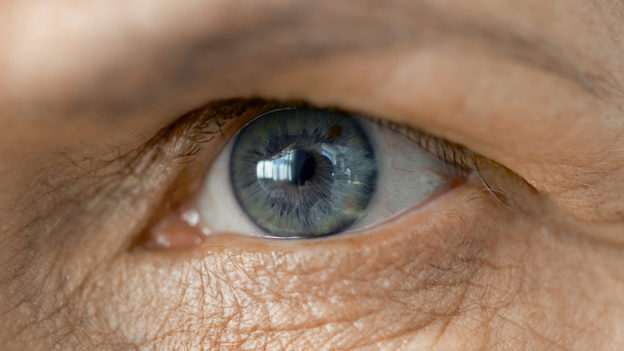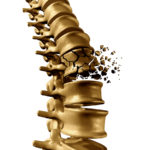By David Blyweiss, M.D., Advanced Natural Wellness
January 21, 2019
There is an obvious reason to take good care of your eyes. To protect your vision.
But there is another reason that is equally important. It’s something people don’t hear much about. So it always comes as a surprise to my patients when I tell them this:
“If you want to protect your brain, it’s urgent that you take immediate measures to support healthy vision.”
It sounds crazy, right? But it’s not.
As hard as it might be to imagine this, your retinas are actually an extension of your brain and central nervous system. This means any neurodegeneration in the eyes can spread to the brain. (And as you may well know, Alzheimer’s disease is a neurodegenerative disorder of the brain.)
MD Exposes the Hidden Danger to Your Eyes

When your eyesight starts to fail, it's a real problem. Suddenly you can't go to the grocery store... you can't get to the doctor if you have an emergency... you can't meet your friends for dinner…
Your "regular" doctor doesn't have time to keep up with the latest research. And the same goes for eye doctors. They go to school to learn how to fit you for glasses and contacts, but have no way of preventing the damage and loss of eyesight that threatens your freedom and independence.
Let me show you something that explains a LOT about how your eyes work.
In my FREE Special Report, I'll show you a HUGE, untapped resource for your eyes that safely and naturally restores clear, effortless eyesight.
Click here to get started...
And here’s a pretty frightening little factoid:
The eyes and brain are so closely linked that many of today’s most common vision problems increase your risk of Alzheimer’s by up to 50%! Vision-robbing conditions like macular degeneration, glaucoma and diabetic retinopathy are particularly devastating to your mental function.
I’ve seen it many times over the years in my own patients. Those with eye disorders and low macular density often start showing signs of mental decline and the onset of dementia.
Interestingly, I’ve also noticed something else about these patients. They frequently have low levels of two specific carotenoids; lutein and zeaxanthin.
So is it possible that these two well-recognized “eye nutrients” might have something to do with the brain?
Sure it is!
Save Your Vision to Save Your Brain
The amount of lutein and zeaxanthin in your macula has a direct correlation to the amount in your brain. In other words, if your macula is brimming with these nutrients, so is your brain.
But if your macula is deficient in them, your brain is, too. And a situation like this could place you at extremely high risk of Alzheimer’s.
The World's Quickest Solution for Ending Prostate and Urinary Misery
This has recently been revealed to be one of the only real breakthroughs in prostate health.
The seeds of a strange fruit (sometimes called "Chinese Apples") hold powerful phytonutrients that are a revolution in prostate health.
In fact, UCLA and Veterans Administration research have now proved this to be true.
Not only that, but it may be the worlds quickest solution for ending prostate misery.
Simply stated, these phytonutrients represent a huge step beyond beta sitosterol, saw palmetto, and other phytosterols alone.
Simply click HERE if you want to have fast prostate relief...restful, uninterrupted sleep...no more constant "urges to go"...enhanced virility...and optimal prostate support for life.
You see, lutein is the primary carotenoid found in the brain. It accumulates in the membranes where it works together with zeaxanthin to promote cognitive function and enhance neural efficiency as you age. (This is true even if you don’t start consuming more of them later in life.)
These two carotenoids also enhance white matter integrity in regions of the brain that are vulnerable to age-related mental decline.
And here’s the best part.
People who increase their intake of these two nutrients can actually boost their cognitive abilities. They show improved attention and processing speeds. They are able to “switch gears” more quickly. They also tend to show better working memory and mental flexibility.
Interestingly, neither of these nutrients is hard to find. You can get plenty of them in your every-day meals.
All you have to do is add plenty of dark leafy greens to your dinner plate. This includes vegetables like kale, turnip greens, collards, spinach and chard. All of them pack a hefty dose of both lutein and zeaxanthin and are easy to add to your diet.
I suggest finding as many ways as you can too add more dark, leafy green vegetables to your meals. Put them in your omelets, salads, smoothies, soups, veggie wraps and wherever else you can think of. Serve them as side dishes with dinner, or sauté them up in a stir fry as your main entrée.
To get maximum support for both your eyes and your brain, I also recommend supplementation. A good eye formula that contains at least 12 mg of lutein and 2 mg of zeaxanthin – along with other eye and brain-supporting nutrients like omega-3 fatty acids, zinc, and vitamins A, C and E – is always a good idea.
SOURCES:
London A, et al. The retina as a window to the brain-from eye research to CNS disorders. Nat Rev Neurol. 2013 Jan;9(1):44-53.
Lee CS, et al. Associations between recent and established ophthalmic conditions and risk of Alzheimer’s disease. Alzheimer’s & Dementia: The Journal of the Alzheimer’s Association. 2018 Aug 2. pii: S1552-5260(18)33034-6.
Nolan JM, et al. Macular pigment, visual function, and macular disease among subjects with Alzheimer’s disease: an exploratory study. J Alzheimers Dis. 2014;42(4):1191-202.
Johnson EJ. Role of lutein and zeaxanthin in visual and cognitive function throughout the lifespan. Nutr Rev. 2014 Sep;72(9):605-12.
Hammond BR, et al. Effects of Lutein/Zeaxanthin Supplementation on the Cognitive Function of Community Dwelling Older Adults: A Randomized, Double-Masked, Placebo-Controlled Trial.Front Aging Neurosci. 2017; 9: 254.
Lindbergh CA, et al. Lutein and Zeaxanthin Influence Brain Function in Older Adults: A Randomized Controlled Trial. J Int Neuropsychol Soc. 2018 Jan;24(1):77-90.
Lindbergh CA, et al. Relationship of Lutein and Zeaxanthin Levels to Neurocognitive Functioning: An fMRI Study of Older Adults. J Int Neuropsychol Soc. 2017 Jan;23(1):11-22.
Mewborn CM, et al. Relation of Retinal and Serum Lutein and Zeaxanthin to White Matter Integrity in Older Adults: A Diffusion Tensor Imaging Study. Arch Clin Neuropsychol. 2018 Nov 1;33(7):861-874.







